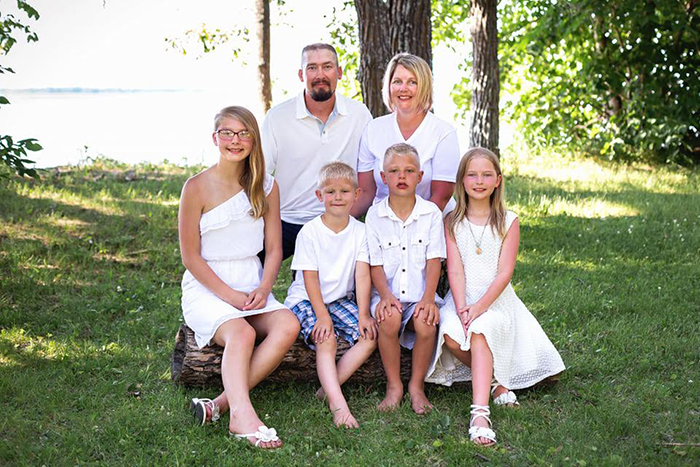A glimpse of the future becomes a call to act
News | Published on October 27, 2021 at 9:18pm GMT+0000 | Author: Chad Koenen
0NY Mills resident uses genetic testing to improve odds against cancer

By Barbie Porter
Editor
History can play a roll in one’s future. While Denise Mursu doesn’t have a crystal ball, she foresaw a future undergoing chemo treatments unless she took drastic measures.
The New York Mills resident explained her family history is abundant when it comes to cancer. Her father had cancer in his stomach, liver and breast, while her uncle also had stomach cancer. Both lost their lives to the disease.
According to the Center for Disease Control, in 2019 cancer was the second leading cause of death in the United States. Heart disease took the dubious honor of being first. The CDC reported 599,601 cancer deaths in 2019; 283,725 were females and 315,876 males.
Mursu recalled watching cancer strip her father of strength. As she was about to head down the aisle to begin her life with her husband, the two decided to bump the wedding date up. Her father was deteriorating fast, and she wanted the privilege of having him walk her down the aisle.
“It was hard for him,” she said. “It all happened really quick. We found out in May (that he had cancer) and started treatment. I was married that October and he passed in April.”
Mursu noted her father went from a typical Midwestern man built by hard work and a hearty appetite to a shell of himself.
“When be passed he looked…,” her voice trailed off. “He fought the best he could. By the end he had lost at least 75 or 80 pounds. He was 62 (years old).”
At the time, Mursu was 22. With the help of her husband Knute, family and friends, she grieved the loss. In time, the Mursus began their own family, which grew to four children.
When women reach their 40s, annual check-ups often include mammograms. The lab test provides a look at breast tissue and may help identify abnormalities that indicate breast cancer. Mursu, who works in the lab at Perham Health knew the importance of the preventative test and scheduled to have one.
Because of her family history with cancer, she said her colleague Dr. Kailey Witt suggested she consider genetic testing. The test would show Mursu what cancers she was predisposed to, if any, based on her genetic code.
“I met with a geneticist and went over my family tree where I told them about the aunts, uncles and different family members who had cancer,” she said.
Vials of blood were drawn and sent to a lab for testing. The results left her in tears.
“I was predisposed to breast cancer, pancreatic cancer, ovarian cancer, stomach cancer and melanoma,” she said, adding she was also determined to have the BRCA2 gene mutation.
With a sarcastic tone, Mursu noted she “Drew the lucky card” to be one of every 500 women in the United States to have either a BRCA1 or BRCA2 gene mutation.
BRCA is an abbreviation for Breast Cancer gene. The name is a bit misleading. All people have BRCA genes, therefore having the gene does not equate to getting cancer. When one (or both) of the BRCA genes mutate, that is when there is an increased likelihood of developing the disease.
For Mursu, testing the gene mutation gave her a glimpse in what her future could be like. Memories of watching her father struggle and knowing all the moments he missed with his grandchildren weighed heavily on her mind. She weighed her options. Either Mursu could wait for a cancer diagnosis and then endure chemotherapy or she could take proactive measures. She opted for the latter.
“I met with my OGBYN in March and in April I had my ovaries and tubes removed,” she said. “Then, in May I met with a breast surgeon after I had a scare with a false positive.”
A routine test led to a whirlwind of events. After getting a positive result for breast cancer, she met with a surgeon and was put on an expedited list for an ultra-sound (to ensure the results were correct). While trying to come to terms with the possibility chemotherapy may be in her future and discussing the options with a surgeon, she learned the results had yielded a false positive.
“I saw what my life might be like if I just waited and did nothing,” she said. “I didn’t want to be on an emotional roller coaster the rest of my life. And, I knew I wanted to give myself the best chance of seeing my kids grow up and knowing my grand kids. My dad never got to know his grandkids.”
Mursu decided to have a bilateral mastectomy. She reported when her ovaries and breasts were removed her chances of developing those cancers dropped significantly.
“There is still a chance, but it is not likely,” she said. “After the surgeries there was a sense of relief.”
Still, her doctors are being cautions and scheduled her for intermittent screenings.
Mursu encouraged all women to take preventative breast cancer exams, and for those with a history of cancer in the family to consider genetic BRCA testing.
